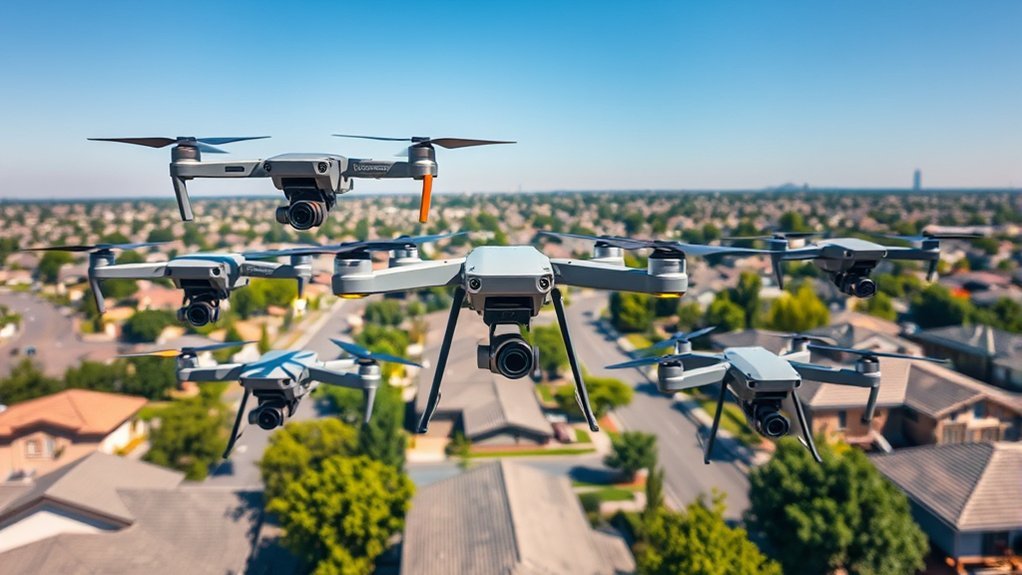You’ll find the G11PRO, Ruko F11PRO 2, N11 PRO, DJI Mini, and V11PRO as top choices for roof inspections. Their 4K to 8K cameras deliver crisp imagery, perfect for spotting details. With robust flight times ranging from 31 to 90 minutes, there’s plenty of opportunity for thorough coverage. Safety and stability features like auto-return, 3-axis gimbals, and intelligent GPS flight modes keep operations secure. Explore how these drones might just be what you’re looking for.
G11PRO 6K Drone with Camera for Adults
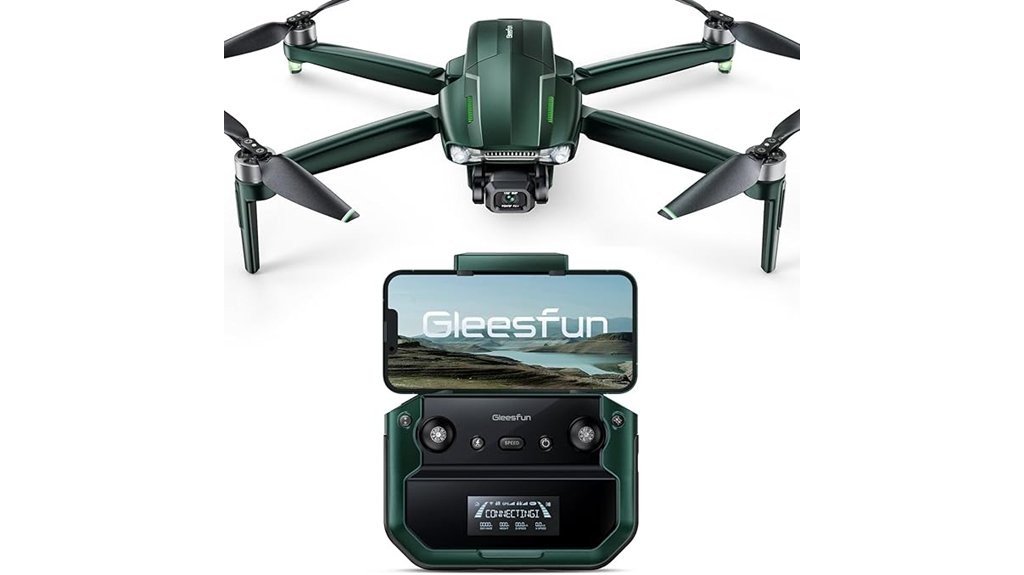
The G11PRO 6K Drone with Camera for Adults is an ideal choice for those seeking the best drones for roof inspection, thanks to its impressive video capabilities and extended flight time. You’ll appreciate its 4K/30fps video and stunning 6K photos, guaranteeing you capture every roof detail with clarity. With a flight range of 10,000 feet and 70 minutes of flight time using two batteries, you can cover large areas efficiently. The 3-axis brushless gimbal and cruise control deliver stable, cinematic footage. Its ergonomic remote makes control easy, while the plug-and-play setup guarantees you’re airborne quickly. Experience high-quality roof inspections effortlessly.
Best For: Those seeking high-quality drones for roof inspection with extended flight time and superior imaging capabilities.
Pros:
- 6K photo resolution and 4K/30fps video for detailed imaging
- 70 minutes of flight time with two batteries for extended operation
- 3-axis brushless gimbal and cruise control for stable, cinematic footage
Cons:
- Requires FAA registration for compliance
- High-end features may be more than needed for casual users
- Premium price point may not suit all budgets
Ruko F11PRO 2 Drone with 6K Camera (Professional Drone)
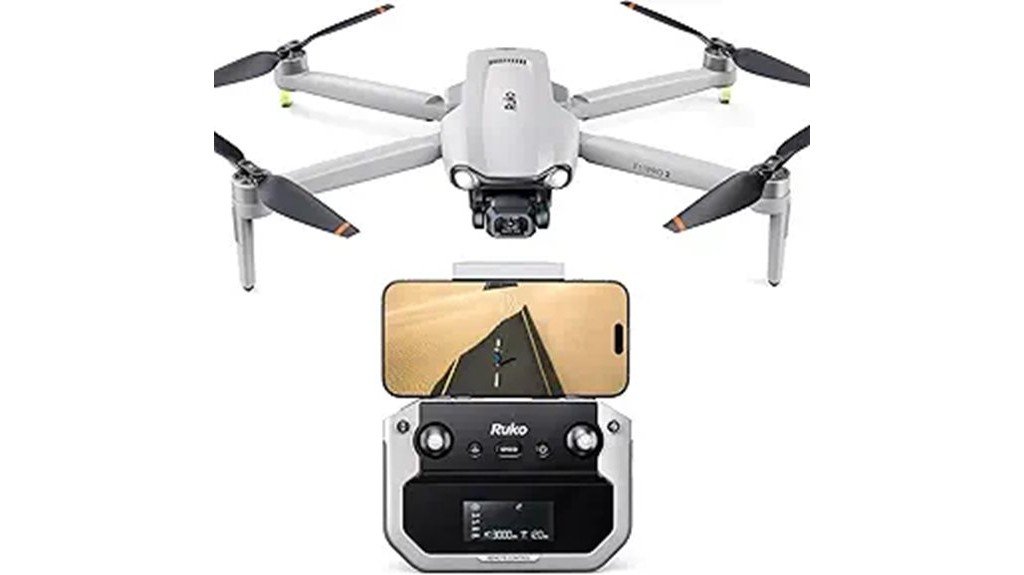
Looking for a professional drone with top-tier imaging capabilities for roof inspections? The Ruko F11PRO 2 Drone stands out with its impressive 6K camera and 4K/30fps video. You’ll capture every detail with its advanced image sensor lens and Night Mode, perfect for low-light conditions. Enjoy an extended flight time of 70 minutes using two batteries, and explore up to 10,000 feet with reliable FPV transmission. Intelligent GPS flight modes like follow-me and orbit flight guarantee precise maneuverability. Weighing just 357 grams, it’s easy to handle and comes with a thorough package, including a carrying case and extra accessories.
Best For: Professionals and hobbyists seeking a high-quality drone for detailed imaging and video capture, particularly useful for applications like roof inspections.
Pros:
- 6K camera with advanced image sensor for capturing fine details.
- Extended 70-minute flight time with two batteries for longer sessions.
- Intelligent GPS flight modes for precise control and maneuverability.
Cons:
- Best Sellers Rank suggests it’s not the top choice in its category.
- At 357 grams, might be considered lightweight for high-wind conditions.
- Requires learning curve for beginners due to advanced features.
N11 PRO GPS Drone with 4K UHD Camera for Adults
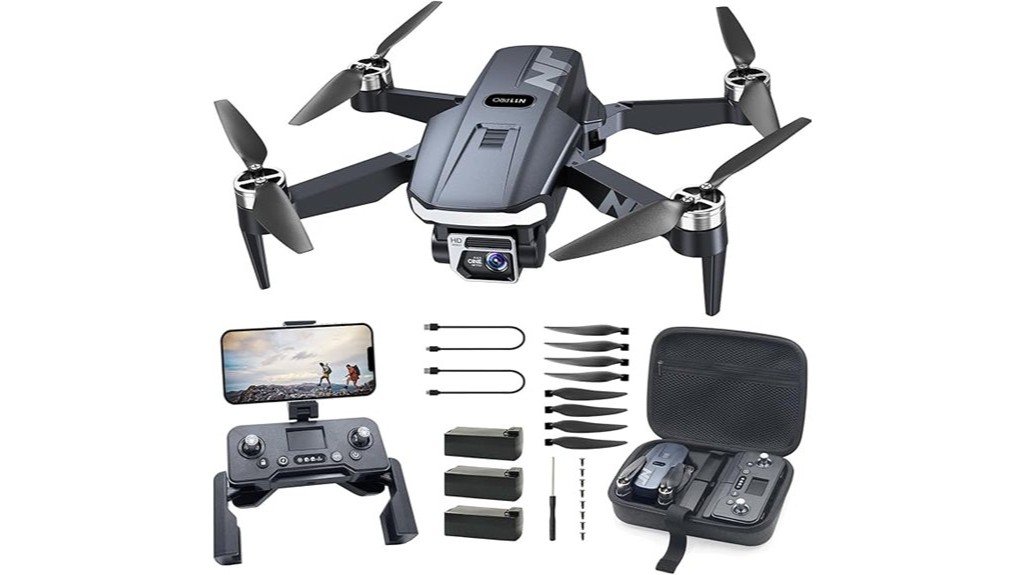
When precision and high-quality imaging are essential for roof inspections, the N11 PRO GPS Drone with a 4K UHD Camera is your go-to choice. Weighing under 0.55lb, it’s easy to transport with its foldable design and durable carrying case. You’ll appreciate its 4K UHD camera, offering 4096×3072 photo resolution and 2048×1080 video, perfect for detailed roof analysis. The N11 PRO’s dual positioning system guarantees stable flight indoors and outdoors, while intelligent features like Follow Me and Tap Fly enhance usability. With up to 90 minutes of flight time and a 3328-foot range, it’s ideal for thorough inspections.
Best For: Professionals needing a portable and high-resolution drone for detailed inspections and outdoor photography.
Pros:
- Lightweight and foldable design for easy transport
- 4K UHD camera with high photo and video resolution
- Long flight time of up to 90 minutes with strong wind resistance
Cons:
- Average customer rating of 3.3 out of 5 stars
- Limited to two color options
- Not suitable for indoor use without Optical Flow positioning system
DJI Mini 4K Camera Drone Combo with 3-Axis Gimbal Stabilization
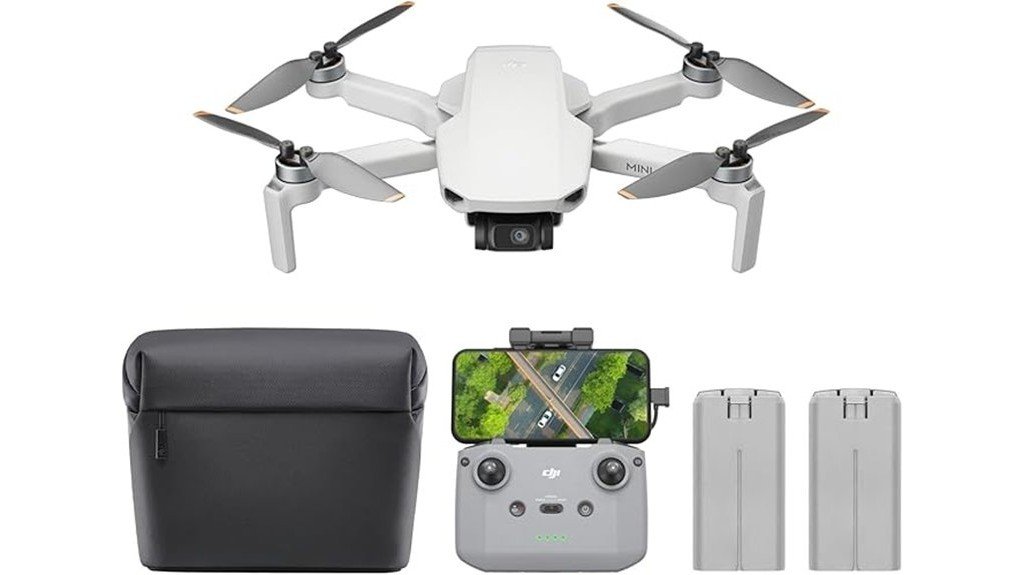
Considering a drone for roof inspection? The DJI Mini 4K Camera Drone Combo is a top contender. Weighing under 249 grams, it doesn’t require FAA registration for recreational use. Its 4K Ultra HD camera with a 12 MP still resolution guarantees crisp visuals, while the 3-axis gimbal stabilization delivers cinematic-quality footage. Enjoy up to 31 minutes of flight per battery, with options for even longer sessions. Its user-friendly features, like one-tap takeoff and GPS Return to Home, make it accessible even for beginners. With a 10 km transmission range and robust wind resistance, it’s designed for reliable performance.
Best For: Beginners and hobbyists looking for an easy-to-use drone with high-quality camera capabilities for recreational purposes.
Pros:
- No FAA registration required for recreational use due to its lightweight design.
- Superior 4K Ultra HD video quality with 3-axis gimbal stabilization for smooth footage.
- Long transmission range of up to 10 km, allowing for expansive exploration.
Cons:
- Flight time may be shorter than advertised, with users reporting around 20 minutes per battery under typical conditions.
- The DJI Fly app is not available on Google Play and must be downloaded from the official website.
- Minor lag in video transmission may occur during high-speed movements or challenging conditions.
V11PRO Drone with 8K Camera and 3-Axis Gimbal
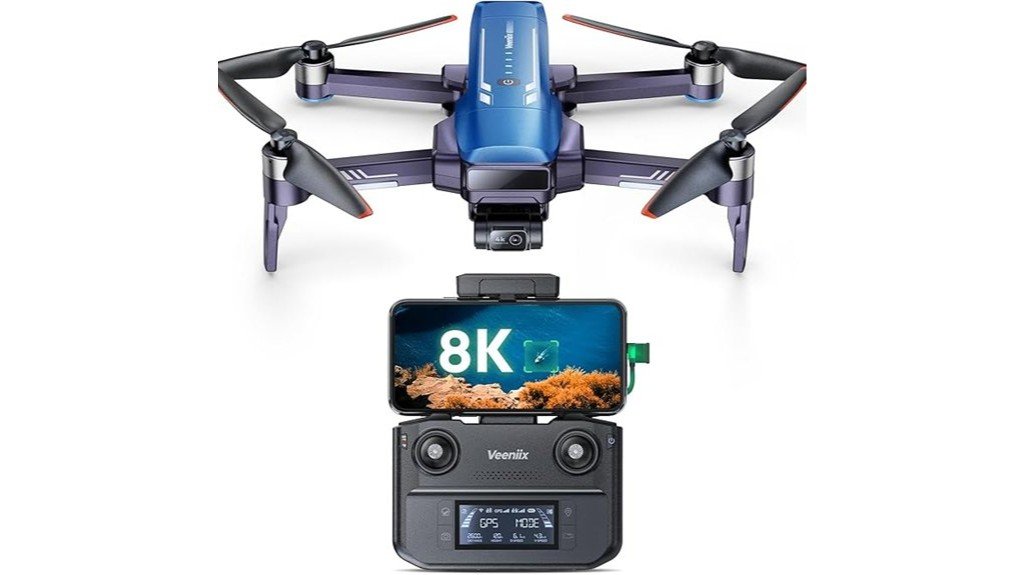
The V11PRO Drone with its 8K camera and 3-axis gimbal is a top choice for professionals seeking detailed and stable imagery for roof inspections. You’ll capture stunning 8K images and 4K video thanks to the 1/2 CMOS sensor, while the 5x digital zoom reveals intricate details. Enjoy 80 minutes of flight time with dual batteries and stay connected over a 6KM range. The app offers intuitive features like waypoint flight and cruise control, making navigation a breeze. Safety’s prioritized with auto-return and advanced sensors. Plus, benefit from 24-hour support and a 1-year warranty for peace of mind.
Best For: Professionals seeking detailed and stable imagery for tasks such as roof inspections and other aerial photography needs.
Pros:
- 8K image and 4K video capability with 5x digital zoom for capturing intricate details.
- Extended flight time of 80 minutes with dual batteries and 6KM operational range.
- User-friendly app with intelligent flight modes like waypoint flight and cruise control.
Cons:
- High return rate due to the need for an adaptation period with advanced features.
- May require additional investment in SD cards for storage of high-resolution images and videos.
- Complex features might be overwhelming for beginners without prior drone experience.
Factors to Consider When Choosing a Drone for Roof Inspection
When choosing a drone for roof inspection, you’ll want to take into account several key factors to guarantee you get the best results. Pay attention to camera resolution, as higher quality means more detailed images. Also, look into flight time, transmission range, stability, and safety features to assure a smooth and effective inspection process.
Camera Resolution Quality
Choosing the right camera resolution quality is essential when you’re selecting a drone for roof inspection. High resolutions like 6K or 8K offer sharper images, making it easier to spot cracks, leaks, and wear on roofs. Pair this with a drone that has a 3-axis gimbal, and you’ll get stable, clear footage even in windy conditions. Advanced imaging technology, such as optical flow sensors and low-light capabilities, guarantees effective inspections regardless of lighting challenges, including nighttime operations. Capturing high-resolution photos, such as 4096×3072, helps document roof conditions over time, providing a reliable visual record. Additionally, formats like MP4 make it simple to integrate video footage into reports, enhancing clarity and communication with stakeholders.
Flight Time Duration
While camera resolution guarantees sharp and detailed imagery, flight time duration is equally essential for a successful roof inspection. You need to assess how long a drone can stay airborne before needing a battery swap or recharge. Typical flight durations range from 31 to 90 minutes, depending on the model. Longer flight times, especially those over 60 minutes, let you conduct thorough inspections without frequent interruptions, covering more ground in a single flight. Drones with dual battery systems offer multiple 35-minute sessions, ideal for complex tasks. Fast charging, around 2.5 hours, reduces downtime, boosting inspection efficiency. Remember, consider flight time alongside range and control features since longer flights could be limited by operational constraints like distance.
Transmission Range Capabilities
Ensuring a drone has a robust transmission range is essential for effective roof inspections. You need a drone that offers a stable video feed and control from a safe distance, with some models reaching up to 10,000 feet. High transmission capabilities maintain video and image quality, minimizing the risk of connection loss or lag during critical inspection moments. Look for drones with advanced digital transmission systems, especially if you’re operating in urban areas where interference is likely. Two-way communication is a valuable feature, allowing you to adjust settings and receive real-time feedback effortlessly. Longer transmission ranges not only enhance safety but also allow you to conduct more thorough inspections, maneuvering the drone around structures while maintaining a safe distance.
Stability and Control
After considering transmission range capabilities, focus on a drone’s stability and control for roof inspections. A 3-axis gimbal stabilization system is essential, ensuring your footage remains stable and clear despite wind and vibrations. This stability lets you capture detailed images with high-quality camera specifications, like 6K photo resolution and 4K video capture, vital for evaluating roof conditions accurately.
Advanced transmission systems maintain stable connections, even up to 10,000 feet, enhancing operational control and reducing the chance of losing your drone mid-inspection. Intelligent flight modes, such as waypoint planning and follow-me features, enable precise maneuvering around roofs, ensuring thorough coverage. With a longer flight time, like 70 minutes using multiple batteries, you can inspect extensively without frequent battery changes.
Safety Features Importance
When considering drones for roof inspections, it’s essential to prioritize safety features. Auto return and obstacle avoidance systems are critical for minimizing crash risks, especially in complex environments. Advanced sensors and GPS technology guarantee stable hovering and precise positioning, reducing accidents and facilitating thorough inspections. Multi-directional flight modes enhance safety by allowing you to maneuver around obstacles and tight spaces with ease. A robust battery management system alerts you to low battery levels, preventing unexpected power loss and guaranteeing complete roof coverage. Additionally, features like emergency landing protocols and remote ID compliance help you quickly regain control or safely land in case of technical failures. These safety features guarantee a smooth and secure inspection process.
Portability and Design
While choosing a drone for roof inspection, portability and design are key factors to evaluate. You want a lightweight model that’s easy to transport and maneuver, especially in tight spaces or uneven terrain. Foldable designs are a big plus, letting you store and carry your drone in a compact case without losing out on features. Always go for a drone that comes with a durable carrying case, protecting it during transit and ensuring it’s ready for use when you need it. The design should also focus on ease of setup and operation, so you can deploy the drone quickly. Check the battery placement too, as accessible batteries make swaps or charging on-site a breeze, saving you valuable time.
Frequently Asked Questions
How Do Drones Handle Harsh Weather Conditions During Roof Inspections?
Drones handle harsh weather by having robust designs and waterproofing features. You might doubt their resilience, but they’re built to withstand rain and wind. Just guarantee you’re using drones specifically designed for such conditions.
What Is the Average Flight Time for Drones Used in Roof Inspections?
You can expect drones used for roof inspections to have an average flight time of 20 to 30 minutes. Battery life depends on weather conditions, the drone model, and the specific tasks you’re performing during inspections.
Are There Legal Restrictions for Flying Drones in Residential Areas?
Yes, you’ll find legal restrictions for flying drones in residential areas. Imagine maneuvering through a maze of rules: maintaining line of sight, respecting privacy, and adhering to altitude limits. Always check local regulations to guarantee compliance before flying.
Can Drones Detect Roof Damage That Is Not Visible to the Naked Eye?
Yes, drones can detect roof damage invisible to the naked eye. They use advanced sensors and thermal imaging to identify issues like moisture intrusion or insulation problems, providing you with detailed data that enhances inspection accuracy.
How Do I Maintain a Drone for Optimal Performance in Roof Inspections?
Your drone’s performance will be as legendary as a superhero’s with regular battery checks, propeller inspections, and software updates. Clean sensors and store it safely to guarantee it’s always ready for precise roof inspections.
